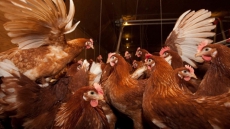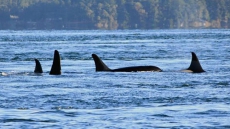VANCOUVER - A fifth poultry farm has been placed under quarantine in British Columbia's Fraser Valley, where an estimated 140,000 birds are expected to be euthanized to contain the avian flu.
Canada's chief veterinary officer Dr. Harpreet Kochhar said the virus was confirmed on Saturday after several turkeys died at the farm in Abbotsford and the producer volunteered to have his animals tested.
That was the same day that officials with the Canada Food Inspection Agency began destroying birds at a second farm in southwestern B.C. to stop the spread of the H5N2 avian flu.
Broiler-breeder chickens in Chilliwack were destroyed on Friday. The outbreak began there, and a turkey farm in Abbotsford.
An estimated 60,000 birds are expected to be destroyed from the latest farm to be quarantined.
Seven countries have now placed varying restrictions on importing poultry meat or poultry products from B.C. or Canada, with the United States, South Africa and Mexico joining four Asian countries: Japan, Taiwan, Hong Kong and South Korea.
The U.S. has banned poultry and poultry products including eggs, from the region, while South Africa and South Korea have extended those restrictions to all provinces and Japan has halted imports of day-old chicks from B.C. and poultry meats from Canada.
"These are temporary restrictions," Kochhar said. "We are working very closely with our international partners to share the information as it develops and discuss specific restriction concerns or requirements."
"The CFIA has mobilized all available resources to manage this situation," he said.
A three-kilometre containment zone has been imposed around the three chicken and two turkey farms, and Kocchar said it will not be surprising if more farms are quarantined in the coming days because the virus is highly contagious.
He said strict measures were introduced after a serious outbreak in the Fraser Valley in 2004, leading officials to order the slaughter of 17 million chickens, turkeys and domestic birds.
"Poultry farmers are urged to take an active role in protecting their flocks by employing strict biosecurity measures on their property and immediately reporting any suspicious symptoms to the CFIA."
B.C.'s chief veterinary officer Dr. Jane Pritchard said the latest farm to be quarantined had no links with the other facilities.
"Very early on we knew that site two had shared birds with sites three and four," she said.
Officials say the virus does not pose a risk to humans if poultry meat is properly handled and cooked, but in rare cases it can be transmitted to people who work in close contact with animals.





